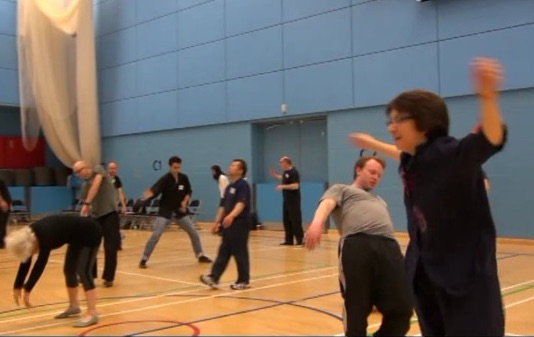LETTING GO

Letting go is very important in chi kung training
Question
Maybe Sifu would also offer his thoughts on if/when letting go is inappropriate in our practice and daily lives.
How can one learn to let go better in various situations?
Sifu Andrew Barrett
Answer
Letting go is a very important requirement in chi kung training. In other words, if a person cannot let go, he cannot train chi kung; he only uses chi kung techniques to perform gentle physical exercise, like many people use Taijiquan techniques to perform Taiji dance.
Letting go may be carried out in degrees. For convenience, we may classify the extent of letting go into three levels:
- Letting go a little.
- Letting go a lot.
- Letting go completely.
How does a practitioner not let go?
He intellectualizes. If he continuously intellectualizes, he has not let go at all. If he intellectualizes 60%, he has let go 40%.
Letting go completely may be inappropriate for some people in daily life. If all other things were equal, one who lets go more will produce better result than another who lets go less. However, other things are not equal. Some people work best under some stress. For them, letting go completely may make them lazy and produce no result.
Letting go is natural. We are born with the natural ability to let go, and this natural ability is well seen in small children. But for most people, because of their ways of living and other factors, they become tensed as they grow into adulthood. So, most people have to re-learn how to let go.
It is simple to let go, though it may not be easy for many people. Just don’t do anything, especially don’t tense muscles and don’t think of anything. Practicing chi kung, genuine chi kung where there is chi flow, is an excellent way to learn letting go. If a person has practiced chi kung successfully for 6 months, he has learned how to let go for 6 months. If he has practiced chi kung for 3 years, letting go has become natural again for him.
Many people outside our school may say that it is easier said than done. It is easier to say not to tense muscles and not to think of anything, than to actually do it. Actually what they mean is that they are too lazy to do it.
We do not say it is easy for them to let go if they have been tensed and stressful habitually. But if they put in some effort and time to do it, they can eventually succeed. If they cannot let go a lot, they can at least let go a little. In my courses, virtually everyone succeeds in the first half hour.
When a person can let go in one situation, he can usually let go in any situation. However, there may be some special occasions when people are tensed or stressful, like when they practice Boxing, write a company report, or in a frightful condition.
If they practice Boxing or write a company report, they become tensed or stressful, usually unconsciously, because they allow themselves to be so. If they have trained with us for some time, they can let go while practicing Boxing or writing a report. In Boxing or any other physical activity, they use their internal force. In writing a report or any intellectual activity, they let their mind flow.
When a person is in a frightful condition, his negative energy of fright is produced and results in him being frightful. If he can let go, his natural energy flow will flush out the negative energy and he will be emotionally calm again.
But if he cannot let go, or if the negative energy is very powerful, it may be locked in his body and manifested as fright for no apparent reason. The same applies to other negative emotions. Practicing chi kung in our school can flush out these negative emotions.
The coming UK Summer Camp, irrespective of whether participants take chi kung courses or kungfu courses or both, is an excellent opportunity to learn or revise letting go so as to enjoy good health, vitality, longevity, mental clarity, peak performance, and spiritual joys irrespective of religion.

Letting go in a kungfu class
The above article is reproduced from the thread Applying and Deepening the Fundamental Skills of Chi Kung in the Shaolin Wahnam Discussion Forum.
LINKS
Courses and Classes
